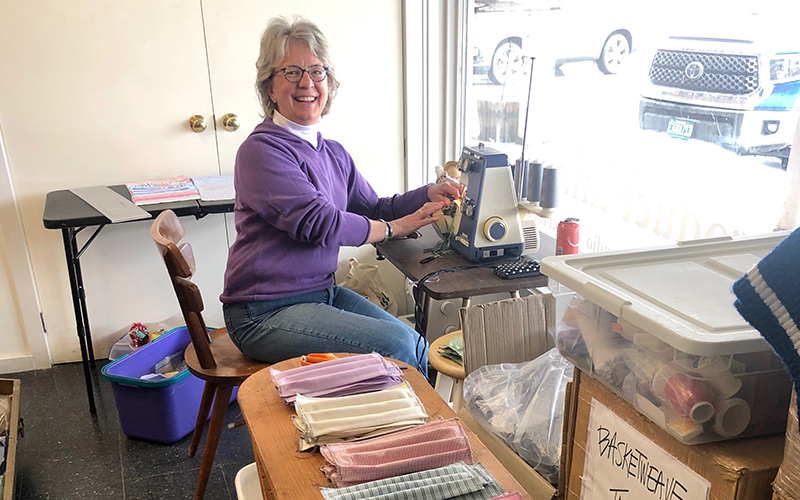Product Think Tank in Waitsfield has become a two-person flurry of activity after owner Annemarie Furey changed her retail clothing store to a medical mask production facility immediately. Furey, Fayston, saw enough pleas by local health care providers to decide she and one of her employees, Kris Chamberlain, Warren, could make it happen.
“I saw a plea from Deaconess Hospital asking people who could make masks to do so. There was an instructional video that was craftier than what we’re going to do. We’re going to produce masks using 100 percent cotton and elastic. They will be washable and reusable,” she said.
As of Tuesday afternoon, March 24, she and Chamberlain had over 100 masks prepped. Chamberlain was using a serging sewing machine to pleat the masks and the pair has cut the wire pieces that will help the mask mold to people’s faces. They are currently waiting on the elastic – due to arrive Thursday – to complete the masks and plan to make 900 of them.
“In addition to Kris, we have a couple of people helping us with the cutting. I’m gathering and vetting the fabric. It has to be 100 percent woven cotton and has to be washed with hot water and bleach before I will take it,” Furey said, noting that men’s dress shirts seem to work the best.
In addition to cutting and prepping, Furey said she has been giving a variety of media interviews since The Valley Reporter interviewed her over the weekend and posted her story to its website and social media.
“The production is as simple as we thought it would be. The prep work is where the time is spent. And getting the wires cut is time consuming,” she said.
She was inspired in part by the MillionMaskChallenge (on Twitter) as well as pleas from hospitals near and far.
Her plan to distribute the masks is being developed. Central Vermont Medical Center and others have approached her about the masks.
Once her 900 masks are completed, she may or may not make more.
“I’m actually hoping that – I’m paying attention to all the news about this – there are companies that are going to be producing masks in bulk. There are now major clothing companies that are gearing up. I’m hoping this will get us over the hump until major manufacturers can fill the demand,” Furey said.
Last weekend, when she decided to make the masks, she reached out to West Hill House B&B for sheets and pillowcases that met her 100 percent woven cotton requirements and she is accepting 100 percent tightly woven cotton men’s and women’s dress shirts at her Mad River Green Shops location. Flannel, T-shirts and loosely woven cotton does not work.
“Dress shirts, we are finding, tend to be a tighter weave than weekend wear,” she added.
Furey needs people to help with cutting the wires and twisting the ends. People with floral and jewelry background and tools would be best suited for this work, she said.
Furey did her homework before deciding to make masks. The Centers for Disease Control had not sanctioned do-it-yourself masks, but now, due to the shortages, medical facilities are reaching out for donated masks and homemade masks. Furey said that tests showed that the best masks were made from two layers of tea cloth, but that those were very hard to breathe through, so two layers of cotton are to be used.
Furey can be reached at






